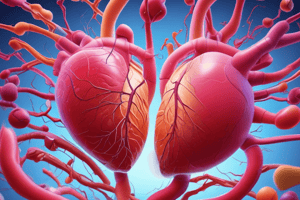Podcast
Questions and Answers
Which medication class is known for preventing calcium from entering cells, resulting in decreased heart rate and myocardial contraction?
Which medication class is known for preventing calcium from entering cells, resulting in decreased heart rate and myocardial contraction?
- Beta blockers
- Cardiac Glycosides
- Vasodilators
- Calcium Channel Blockers (correct)
Which medication class is primarily used for the treatment of hypertension and angina pectoris?
Which medication class is primarily used for the treatment of hypertension and angina pectoris?
- Beta blockers
- Vasodilators (correct)
- Organic nitrates
- Cardiac Glycosides
Which medication is associated with adverse effects such as headaches, drowsiness, flushing, fatigue, dizziness, and edema?
Which medication is associated with adverse effects such as headaches, drowsiness, flushing, fatigue, dizziness, and edema?
- Nitroprusside
- Amlodipine (correct)
- Digoxin
- Hydralazine
Which medication is particularly used in severe hypertension but has potential serious side effects?
Which medication is particularly used in severe hypertension but has potential serious side effects?
Which medication class is known for increasing the force of contraction, slowing conduction, and increasing the refractory period of the heart?
Which medication class is known for increasing the force of contraction, slowing conduction, and increasing the refractory period of the heart?
What is the mechanism of action of Angiotensin Converting Enzyme Inhibitors (ACE Inhibitors)?
What is the mechanism of action of Angiotensin Converting Enzyme Inhibitors (ACE Inhibitors)?
What is a common side effect of Angiotensin Receptor Blockers (ARBs) according to the text?
What is a common side effect of Angiotensin Receptor Blockers (ARBs) according to the text?
How do Angiotensin Receptor Blockers (ARBs) differ from Angiotensin Converting Enzyme Inhibitors (ACE Inhibitors)?
How do Angiotensin Receptor Blockers (ARBs) differ from Angiotensin Converting Enzyme Inhibitors (ACE Inhibitors)?
Which condition are Angiotensin Converting Enzyme Inhibitors (ACE Inhibitors) NOT proven to decrease the risk of according to the text?
Which condition are Angiotensin Converting Enzyme Inhibitors (ACE Inhibitors) NOT proven to decrease the risk of according to the text?
What is a key consideration when administering the first dose of Angiotensin Converting Enzyme Inhibitors (ACE Inhibitors) especially if the patient is on a diuretic?
What is a key consideration when administering the first dose of Angiotensin Converting Enzyme Inhibitors (ACE Inhibitors) especially if the patient is on a diuretic?
What is a unique adverse effect associated with quinidine?
What is a unique adverse effect associated with quinidine?
What is the specific first-line use of quinidine in the African American population?
What is the specific first-line use of quinidine in the African American population?
What is a common early sign of toxicity associated with quinidine that should be monitored?
What is a common early sign of toxicity associated with quinidine that should be monitored?
Which drug works directly on smooth muscle to promote vein dilation and decrease oxygen demand?
Which drug works directly on smooth muscle to promote vein dilation and decrease oxygen demand?
Why is it important to handle nitroglycerin carefully, avoiding light, heat, or moisture?
Why is it important to handle nitroglycerin carefully, avoiding light, heat, or moisture?
What is the specific use of captopril?
What is the specific use of captopril?
Which drug category can cause rebound hypertension if stopped abruptly?
Which drug category can cause rebound hypertension if stopped abruptly?
What effect does aliskirin have on the Renin-Angiotensin-Aldosterone System (RAAS)?
What effect does aliskirin have on the Renin-Angiotensin-Aldosterone System (RAAS)?
Which drug is a selective aldosterone receptor blocker with fewer side effects than spironolactone?
Which drug is a selective aldosterone receptor blocker with fewer side effects than spironolactone?
For which condition is lisinopril specifically used?
For which condition is lisinopril specifically used?
What is the term for a solution with the same concentration as plasma?
What is the term for a solution with the same concentration as plasma?
Which part of the nephron is responsible for early reabsorption of sodium and chloride?
Which part of the nephron is responsible for early reabsorption of sodium and chloride?
What is the main function of diuretics in the body?
What is the main function of diuretics in the body?
Which diuretic is considered less potent and more suitable for outpatient use?
Which diuretic is considered less potent and more suitable for outpatient use?
What is the action of diuretics like furosemide on sodium and chloride in the body?
What is the action of diuretics like furosemide on sodium and chloride in the body?
Which term refers to the condition of decreased urine output?
Which term refers to the condition of decreased urine output?
What effect does blocking Na and Cl reabsorption have on urine excretion?
What effect does blocking Na and Cl reabsorption have on urine excretion?
What is the mechanism of action of spironolactone in the context of diuretics?
What is the mechanism of action of spironolactone in the context of diuretics?
Which adverse effect is unique to loop diuretics like furosemide compared to other diuretics mentioned?
Which adverse effect is unique to loop diuretics like furosemide compared to other diuretics mentioned?
What is a common adverse effect experienced with triamterene, another potassium-sparing diuretic?
What is a common adverse effect experienced with triamterene, another potassium-sparing diuretic?
How does mannitol, an osmotic diuretic, differ from loop and potassium-sparing diuretics in terms of its mechanism of action?
How does mannitol, an osmotic diuretic, differ from loop and potassium-sparing diuretics in terms of its mechanism of action?
Which diuretic is known for reducing intracranial pressure and intraocular pressure as part of its therapeutic uses?
Which diuretic is known for reducing intracranial pressure and intraocular pressure as part of its therapeutic uses?
What electrolyte imbalance is specifically associated with loop diuretics like furosemide?
What electrolyte imbalance is specifically associated with loop diuretics like furosemide?
Which drug interaction concern is unique to spironolactone among the mentioned diuretics?
Which drug interaction concern is unique to spironolactone among the mentioned diuretics?
What caution should be exercised when administering triamterene related to its side effects?
What caution should be exercised when administering triamterene related to its side effects?
What is the term for a solution that has a greater concentration than plasma?
What is the term for a solution that has a greater concentration than plasma?
Which medication is used to treat high potassium levels by avoiding foods or medications containing K?
Which medication is used to treat high potassium levels by avoiding foods or medications containing K?
In the context of fluid volume excess therapy, what is the primary effect of diuretics on Na and Cl reabsorption?
In the context of fluid volume excess therapy, what is the primary effect of diuretics on Na and Cl reabsorption?
What is the main classification of diuretics that blocks Na and Cl in the loop of Henle and distal convoluted tubule?
What is the main classification of diuretics that blocks Na and Cl in the loop of Henle and distal convoluted tubule?
Which term refers to a condition characterized by abnormally low urine output?
Which term refers to a condition characterized by abnormally low urine output?
What percentage of water reabsorption occurs in tubular secretion?
What percentage of water reabsorption occurs in tubular secretion?
Which term describes a solution with a concentration less than that of plasma?
Which term describes a solution with a concentration less than that of plasma?
What is the mechanism of action of spironolactone as a diuretic?
What is the mechanism of action of spironolactone as a diuretic?
Which electrolyte imbalance is NOT commonly associated with spironolactone use?
Which electrolyte imbalance is NOT commonly associated with spironolactone use?
What is the unique adverse effect of triamterene among the mentioned diuretics?
What is the unique adverse effect of triamterene among the mentioned diuretics?
Which drug interaction concern is common to triamterene and spironolactone as potassium-sparing diuretics?
Which drug interaction concern is common to triamterene and spironolactone as potassium-sparing diuretics?
How does mannitol differ in mechanism of action compared to loop and potassium-sparing diuretics?
How does mannitol differ in mechanism of action compared to loop and potassium-sparing diuretics?
Which condition is NOT listed among the therapeutic uses of loop diuretics like furosemide?
Which condition is NOT listed among the therapeutic uses of loop diuretics like furosemide?
What is a common adverse effect of loop diuretics like furosemide that sets them apart from potassium-sparing diuretics?
What is a common adverse effect of loop diuretics like furosemide that sets them apart from potassium-sparing diuretics?
What is the primary site of sodium absorption and diuretic action in the kidneys?
What is the primary site of sodium absorption and diuretic action in the kidneys?
Which term describes a condition of abnormally low urine output?
Which term describes a condition of abnormally low urine output?
What is the mechanism through which diuretics like furosemide impact urine excretion?
What is the mechanism through which diuretics like furosemide impact urine excretion?
Which diuretic is less potent and more suitable for outpatient use?
Which diuretic is less potent and more suitable for outpatient use?
What is the term for a solution that has a concentration greater than that of plasma?
What is the term for a solution that has a concentration greater than that of plasma?
In the context of diuretics, what does the term 'nephron' primarily refer to?
In the context of diuretics, what does the term 'nephron' primarily refer to?
What is the main classification of diuretics that blocks sodium and chloride in early reabsorption within the loop of Henle?
What is the main classification of diuretics that blocks sodium and chloride in early reabsorption within the loop of Henle?
Which electrolyte imbalance is NOT commonly associated with loop diuretics like furosemide?
Which electrolyte imbalance is NOT commonly associated with loop diuretics like furosemide?
What is a common adverse effect associated with the potassium-sparing diuretic spironolactone?
What is a common adverse effect associated with the potassium-sparing diuretic spironolactone?
What is a unique adverse effect of triamterene among the mentioned diuretics?
What is a unique adverse effect of triamterene among the mentioned diuretics?
What electrolyte imbalance is specifically associated with spironolactone use?
What electrolyte imbalance is specifically associated with spironolactone use?
What is a common adverse effect experienced with mannitol, an osmotic diuretic?
What is a common adverse effect experienced with mannitol, an osmotic diuretic?
What caution should be exercised when administering triamterene related to its side effects?
What caution should be exercised when administering triamterene related to its side effects?
Which drug interaction concern is common to triamterene and spironolactone as potassium-sparing diuretics?
Which drug interaction concern is common to triamterene and spironolactone as potassium-sparing diuretics?
What is the mechanism of action of spironolactone as a potassium-sparing diuretic?
What is the mechanism of action of spironolactone as a potassium-sparing diuretic?
Which medication is known for reducing intracranial pressure and intraocular pressure among the listed diuretics?
Which medication is known for reducing intracranial pressure and intraocular pressure among the listed diuretics?
What electrolyte imbalance is specifically associated with loop diuretics like furosemide?
What electrolyte imbalance is specifically associated with loop diuretics like furosemide?
Which diuretic directly inhibits Na/K exchange, causing side effects such as dizziness, headache, and diarrhea?
Which diuretic directly inhibits Na/K exchange, causing side effects such as dizziness, headache, and diarrhea?
What is a unique endocrine effect associated with triamterene among the mentioned diuretics?
What is a unique endocrine effect associated with triamterene among the mentioned diuretics?
Which electrolyte imbalance is NOT commonly associated with spironolactone use?
Which electrolyte imbalance is NOT commonly associated with spironolactone use?
What is a common adverse effect experienced with mannitol, an osmotic diuretic?
What is a common adverse effect experienced with mannitol, an osmotic diuretic?
Which term describes a condition of abnormally high urine output?
Which term describes a condition of abnormally high urine output?
What electrolyte imbalance is specifically associated with the use of sodium polystyrene sulfonate or dialysis for treating high potassium?
What electrolyte imbalance is specifically associated with the use of sodium polystyrene sulfonate or dialysis for treating high potassium?
Where does urine formation primarily involve filtrations, reabsorption, and tubular secretion?
Where does urine formation primarily involve filtrations, reabsorption, and tubular secretion?
What is the most suitable diuretic for outpatient use due to being less potent compared to others?
What is the most suitable diuretic for outpatient use due to being less potent compared to others?
Which term refers to a solution that has a greater concentration than plasma?
Which term refers to a solution that has a greater concentration than plasma?
What effect does blocking Na and Cl reabsorption have on urine excretion?
What effect does blocking Na and Cl reabsorption have on urine excretion?
Which classification of diuretics blocks Na & Cl in the early reabsorption in the loop of Henle and distal convoluted tubule?
Which classification of diuretics blocks Na & Cl in the early reabsorption in the loop of Henle and distal convoluted tubule?




